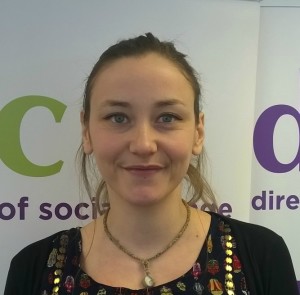The serious business of kindness
In her last action for DSC before going on maternity leave the day after Trump won the US election, DSC Research Carly Hobson, reflects on what this means for the future and how we can all work to make it brighter
‘In an individual, selfishness uglifies the soul; for the human species, selfishness is extinction’ – Cloud Atlas, David Mitchell
 Today is my last day at DSC before I go off on maternity leave with my first child. It’s a beautifully exciting time, but what a time to go following the results of the US presidential election. This has been a messy year with hate crime growing against those who are the most vulnerable in our society. It worries me, the kind of world my little one is being brought into, where politicians on both sides of ‘the pond’ can act in such a way that gives legitimacy to racism, misogyny and hatred.
Today is my last day at DSC before I go off on maternity leave with my first child. It’s a beautifully exciting time, but what a time to go following the results of the US presidential election. This has been a messy year with hate crime growing against those who are the most vulnerable in our society. It worries me, the kind of world my little one is being brought into, where politicians on both sides of ‘the pond’ can act in such a way that gives legitimacy to racism, misogyny and hatred.
However, I feel strangely positive and determined. I want my daughter to grow up strong, brave, happy and, above all else, kind. I feel that there is a real deficit of kindness within our communities. We live in a highly individualised world, cut off from one another and the true experiences of people ‘different’ to ourselves, and we face an epidemic of loneliness as a result.
Depression in the Western World is a health crisis. 3.9 million older people in the UK say the TV is their main source of company (WHO) and a couple of years ago the Office of National Statistics found Britain to be the loneliness capital of Europe. With a highly biased media controlled by just a handful of people, and politicians who capitulate to that media and offer ‘easy’ answers as to who to blame (i.e. the most vulnerable), it’s easy for hate and fear to grow.
A lot of people are feeling devastated, not just about the election result but about the messy, hate-filled presidential campaign. The solution, as I see it, is to not give in to hate but react with kindness. That’s not to say you can’t be angry, but to fight hate with more hate doesn’t work. Kindness can have teeth and can be incredibly effective.
It’s time to take kindness seriously. Encouragingly, this is already being done amongst some sections of the voluntary sector. A new report by the JRF and Carnegie Trust demonstrates the importance of everyday kindness in increasing well-being within individuals and communities, acting as a catalyst for social change.
The report notes that kindness is a precursor for community activity (e.g. volunteering) and that people have lost trust in institutional solutions to complex social problems due to a ‘perceived lack of humanity’ in these institutions. The report also notes that: “The voluntary sector is as much caught up in this ‘institution think’ as government”.
The voluntary sector is in a position to campaign about the long-term effects of hatred in our communities. We can see who shouts the loudest, clamouring for our individual causes, talking over one another and losing sight of the bigger picture. Or we can realise we are bigger than our single cause, that we need to work holistically and inter-connectedly to face and speak out about the challenges facing us now. And we can do so with absolute kindness to ourselves, our beneficiaries, our wider communities. Real kindness takes courage and is incredibly powerful; it can kill loneliness and hatred. It can make us truly happy, unite us, and save the world.
First published in Third Sector Magazine, 15 November 2016